
Episode 33: Year A – 14th Sunday of Ordinary Time
In this episode of the Sunday Catholic Word, we highlight four details that are relevant for doing apologetics from the readings for this upcoming 14th Sunday of Ordinary Time, Year A. Two of them, which have to do with the bodily nature of Christ’s resurrection and the possibility for Christians forfeiting the gift of salvation, comes from the second reading, taken from Romans 8:9, 11-13. The other two come from the Gospel reading, taken from Matthew 11:25-30. The apologetical topics that arise out of the Gospel reading are the Historical reliability of Jesus’ teaching about the uniqueness of His knowledge of the Father and the Father’s knowledge of Him and Jesus’ Divinity.
Looking for Sunday Catholic Word Merchandise? Look no further! https://shop.catholic.com/catholic-answers-merchandise/?q=sunday
Hey everyone,
Welcome to The Sunday Catholic Word, a podcast where we reflect on the upcoming Sunday Mass readings and pick out the details that are relevant for explaining and defending our Catholic faith.
I’m Karlo Broussard, staff apologist and speaker for Catholic Answers, and the host for this podcast.
In this episode, we’re going to highlight five details from the readings for this upcoming 14th Sunday of Ordinary Time, Year A, that are relevant to doing apologetics. Two of them, which have to do with the bodily nature of Christ’s resurrection and the possibility for Christians forfeiting the gift of salvation, comes from the second reading, taken from Romans 8:9, 11-13. The other three come from the Gospel reading, taken from Matthew 11:25-30. The apologetical topics that arise out of the Gospel reading are the Historical reliability of Jesus’ teaching about the uniqueness of His knowledge of the Father and the Father’s knowledge of Him and Jesus’ Divinity.
Let’s get started with Paul’s teaching from Romans 8:9, 11-13. He writes,
You are not in the flesh;
on the contrary, you are in the spirit,
if only the Spirit of God dwells in you.
Whoever does not have the Spirit of Christ does not belong to him.
If the Spirit of the one who raised Jesus from the dead dwells in you,
the one who raised Christ from the dead
will give life to your mortal bodies also,
through his Spirit that dwells in you.
Consequently, brothers and sisters,
we are not debtors to the flesh,
to live according to the flesh.
For if you live according to the flesh, you will die,
but if by the Spirit you put to death the deeds of the body,
you will live.
The first detail to highlight is Paul’s statement in verse 11, “the one who raised Christ from the dead will give life to your mortal bodies also.” Notice Paul emphasis on our mortal bodies. And Paul bases the resurrection of our mortal bodies on Christ’s resurrection, the implication being that Christ’s mortal body was raised as well. This comparison is confirmed elsewhere by Paul in1 Corinthians 15:49, where he writes, within the context of our bodily resurrection at the end of time, “Just as we have borne the image of the man of dust, we shall also bear the image of the man of heaven.” If we will rise bodily, as Paul says we will, and we image the resurrection of Jesus, then it follows that Jesus rose bodily as well.
Now, why is this significant? Well, there are some who assert that Jesus’ resurrection was not bodily, but merely spiritual. Some say that only Jesus’ spirit lived on and the early Christians called that a resurrection. Others say that Jesus merely rose in the hearts of the apostles as they came to believe in Him. But Paul’s teaching about our bodily resurrection, and its imaging of Christ’s resurrection, refutes these ideas.
The second detail is Paul’s teaching, “if you live according to the flesh, you will die, but if by the Spirit you put to death the deeds of the body, you will live.” It’s important to remember who he is talking to here: born again Christians.
Why is this significant? Some Christians believe that once you’re born again, or saved, you are eternally secure in that salvation. But if that were true, why would Paul warn such Christians that if they—the born-again Christians in Rome—live according to the flesh, they will die (spiritually speaking)? Paul doesn’t say, “If non-Christians live by the flesh, they will die.” Rather, he says, “If you live by the flesh, you will die.” Assuming that the death Paul is speaking about here is spiritual and not physical, which it seems to be, this text reveals Paul’s belief that it’s possible for Christians to lose the gift of salvation. Therefore, the idea that once you’re a Christian you’re eternally secure in your salvation is false.
Now we can turn to the Gospel reading, which, again, is taken from Matthew 11:25-30. Jesus says,
At that time Jesus exclaimed:
“I give praise to you, Father, Lord of heaven and earth,
for although you have hidden these things
from the wise and the learned
you have revealed them to little ones.
Yes, Father, such has been your gracious will.
All things have been handed over to me by my Father.
No one knows the Son except the Father,
and no one knows the Father except the Son
and anyone to whom the Son wishes to reveal him.”
“Come to me, all you who labor and are burdened,
and I will give you rest.
Take my yoke upon you and learn from me,
for I am meek and humble of heart;
and you will find rest for yourselves.
For my yoke is easy, and my burden light.”
The first detail I want to focus on is Jesus’ teaching about the relationship and He and the Father have. Again, He says,
All things have been handed over to me by my Father.
No one knows the Son except the Father,
and no one knows the Father except the Son
and anyone to whom the Son wishes to reveal him.”
There are two apologetical issues that this teaching pertains to. First, the historicity of the teaching. It meets the criterion of multiple attestation. John records substantially the same teaching in His Gospel. Consider, for example, John 3:35: “the Father loves the Son, and has given all things into his hand.” This is the same as what Matthew records: “All things have been handed over to me by my Father.”
Moreover, the unique knowledge that the Father and the Son have of each other is also multiply attested to. John records substantially the same teaching in two places: John 10:14-15 and John 17:25. In John 10:15, John records Jesus saying, “[T]he Father knows me and I know the Father.” John 17:25 reads, “O righteous Father, the world has not known you, but I have known you; and these know that you have sent me. 26 I made known to them your name, and I will make it known.” Not only do we have the teaching about the Father and the Son knowing each other in a unique and special way, but we also have the extra tidbit of Jesus making the Father known.
So, we have two independent sources attesting to Jesus’ teaching, giving it a high degree of historical reliability.
Now, if you reject the Q source theory, which says that some material in Matthew and Luke come from an unknown source, then Luke 10:22, which is where Luke records this teaching, would provide yet another independent attestation to this teaching.
So much for the historicity topic. Let’s move to the next topic that this teaching is related to—Jesus’ Divinity.
Recall, Jesus says, “No one knows the Son except the Father.” To say that only the Father is adequate to know the Son puts the Son on an equal transcendent plane as the Father. What Jesus is saying here is that you must be God to know the Son. Well, the only thing that requires divine power to know is that which is divine— God Himself. Therefore, Jesus claims divinity.
The other two details in this Gospel reading are also related to Jesus’ divinity. For example, Jesus speaks of us taking on his “yoke” and receiving rest from our burdens.
Let’s consider the “yoke” image first.
The image of the “yoke” in Scripture is a metaphor for the Law. See Jeremiah 5:5, Sirach 51:26 and Acts 15:10. Now, here in the Gospel reading Jesus is encouraging His disciples taken on His yoke—that’s to say, His Law. But wait a minute! Who gave us the Law in the Old Testament? Almighty God! He alone has the authority to issue a Law, and even human authority that issues laws derive their authority ultimately from God.
So, for Jesus to say that we need to take on His Law, not Yahweh’s Law, he’s either usurping the very authority of God, or He has divine authority to issue a His own Law in which case he would have to be God. Surely, we don’t want to say that He’s usurping God’s authority. Therefore, He is God.
Now, the other detail that reveals Jesus’s Divinity is the rest that He promises to give when we take on His yoke. And it does so in two ways. First, when we combine the detail of the “yoke” with the detail of Jesus inviting His disciples to come to Him and receive the rest that He will give, we see Jesus as the embodiment of God’s wisdom, described in Sirach 51.
In Sirach 51:23, wisdom calls to God’s people, “draw near to me.” In verse 26, it says, “put your neck under the yoke,” and then in verse 27, “see with your eyes that I have labored little and found for myself much rest.” Jesus’s teaching in our Gospel reading is almost a verbatim quote of these texts. The revealed truth is that Jesus personifies, is the embodiment of, God’s wisdom.
Now, if the wisdom of God is God Himself, since His wisdom is identical to His very being, and Jesus is teaching us that He is the very wisdom of God, then it follows that Jesus believed Himself to be divine.
There’s one more detail that’s related to Jesus’ Divinity. It’s Jesus’ teaching that He will give rest to those who come to Him. Ask yourself this question: what in the Old Testament was rest associated with? You’ve probably guessed it: the Sabbath. The rest of the Sabbath even becomes center stage just a few verses later in 12:1-14.
Well, who was the author of the Sabbath? Who gave it to us and ordered it to our rest? Almighty God! But yet here Jesus is offering us a rest apart from, and even over and above, the rest that the Sabbath offers, a rest that is heavenly rather than earthly. This implies that He has the authority equal to God. How could Jesus make such a claim unless He believed that He had such equality with God? The answer is that He did believe He was equal to God. He believed He was divine.
Conclusion
So, the second and Gospel readings for this upcoming 14th Sunday of Ordinary Time is a treasure chest for apologetics. We have details that relate to:
- The bodily nature of Jesus’ resurrection in contrast to spiritual resurrection theories,
- The historicity of Jesus’ teaching about the unique relationship that He has with the Father, and
- Jesus’ Divinity
Well, that does it for this episode of the Sunday Catholic Word.
Thank you so much for subscribing to the podcast. Please be sure to tell your friends about it and invite them to subscribe as well. Also, if you’re interested in getting some cool mugs and stickers with my logo, “Mr. Sunday podcast,” go to shop.catholic.com.
I hope you have a blessed 14th Sunday of Ordinary Time.



